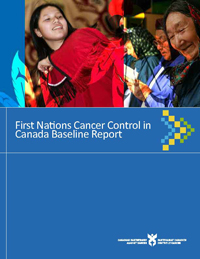New resources highlight the need for culturally safe cancer care in First Nations communities
December 16, 2013

TORONTO — While cancer affects everyone, rates of common cancers have increased among First Nations, Inuit and Métis people in the past few decades and in some populations are now at or above those in the general Canadian population. A new report released today examines cancer control for First Nations across Canada and provides a baseline against which progress can be measured over the coming years.
“First Nations view health from a holistic perspective, so when we are presented with a problem, we look at it using many different lenses,” says Dr. Evan Adams, Board Member for the Canadian Partnership Against Cancer. “This report attempts to do just that. It looks at the many unique aspects of the cancer journey faced by First Nations, as well as showcasing the leading clinical practices and models of care to advance cancer control in our communities.”
The First Nations Cancer Control in Canada Baseline Report provides context for the cancer pathway for First Nations peoples and includes information on promising practices across the cancer control continuum. It looks at the patient experience from screening and diagnosis through to survivorship or palliative care, as well as challenges experienced by First Nations patients throughout their cancer journey.
“We are excited to be able to provide an overview of the landscape of First Nations cancer care and control as we currently know it,” says Lee Fairclough, Vice-President, Strategy, Knowledge Management and Delivery at the Partnership. “Addressing the gaps identified in this report will have a positive impact on the patient experience and outcomes and we are beginning to see this in our work with partners.”
The Canadian Partnership Against Cancer works closely with First Nations, Inuit and Métis peoples and organizations to advance culturally relevant and people-specific cancer control initiatives that best reflect their needs and priorities.
In 2014, the Partnership will release an Inuit Baseline Report and a Métis Baseline Report to further examine emerging priorities for action among these communities. The majority of information within the series of baseline reports for First Nations, Inuit and Métis cancer control are sourced from environmental scans completed in 2012.
To personalize the unique needs of this population, the Partnership also released today a new The Truth of It video that brings the First Nations cancer journey to life. In this video, Alan Polchies Jr. shares his experience undergoing cancer treatment and the support he received from his community of St. Mary’s First Nation in Fredericton, New Brunswick. Now cancer free, Polchies talks about the importance of incorporating his culture and spirituality into his treatment.
About the Canadian Partnership Against Cancer
The Canadian Partnership Against Cancer works with Canada’s cancer community to reduce the burden of cancer on Canadians. Grounded in and informed by the experiences of those affected by cancer, the organization works with partners to support multi-jurisdictional uptake of evidence that will help to optimize cancer control planning and drive improvements in quality of practice across the country. Through sustained effort and a focus on the cancer continuum, the organization supports the work of the collective cancer community in achieving long-term population outcomes: reduced incidence of cancer, less likelihood of Canadians dying from cancer, and an enhanced quality of life of those affected by cancer.
Advancing cancer control with and for First Peoples is a priority of the Canadian Partnership Against Cancer.
